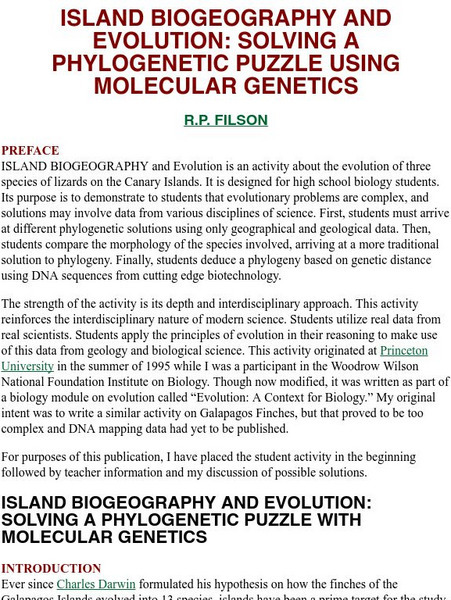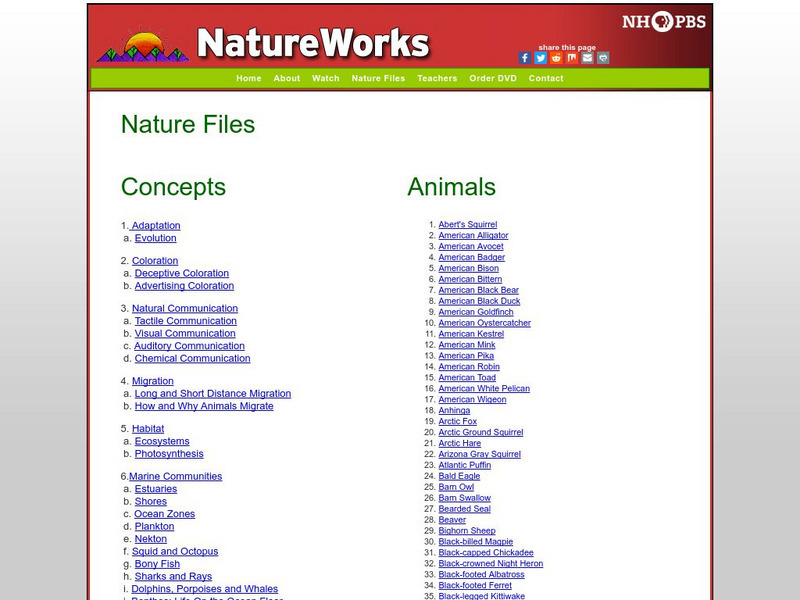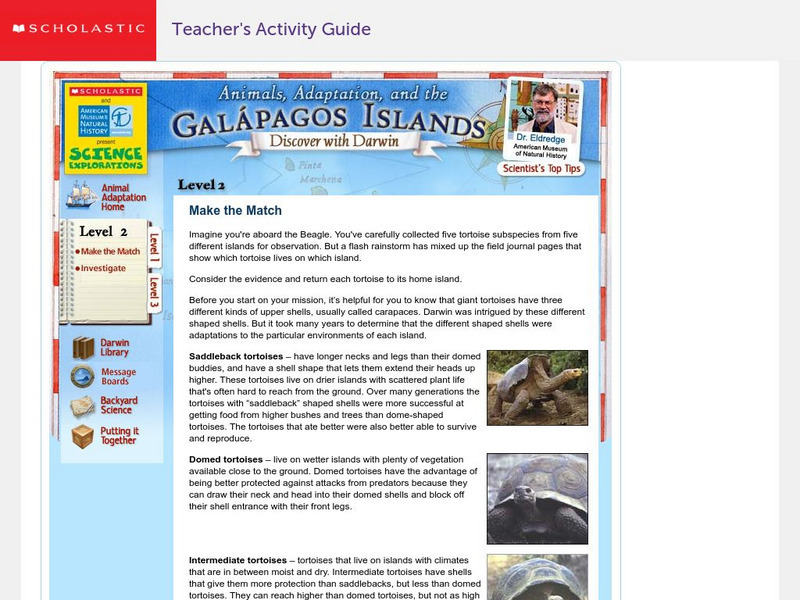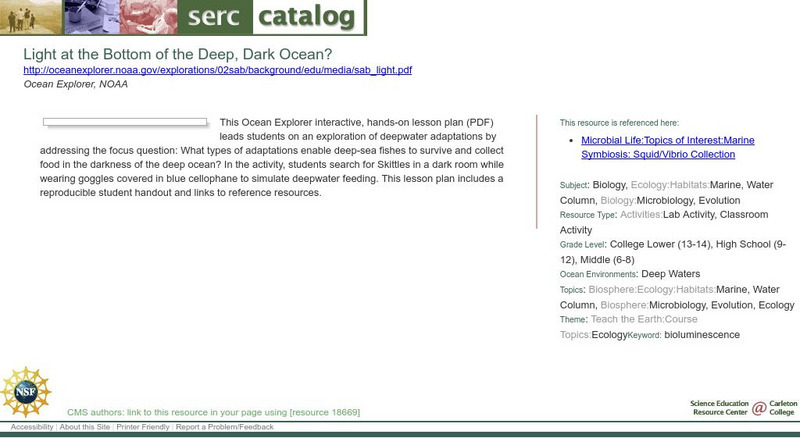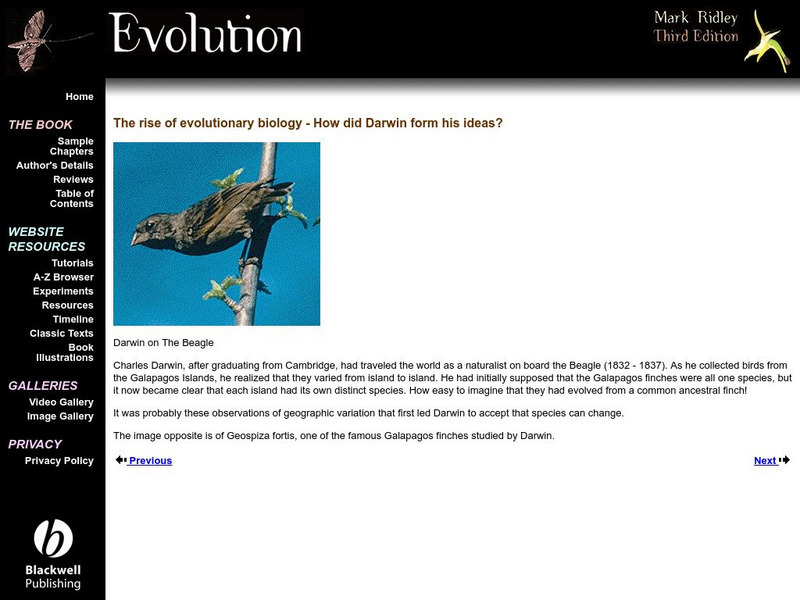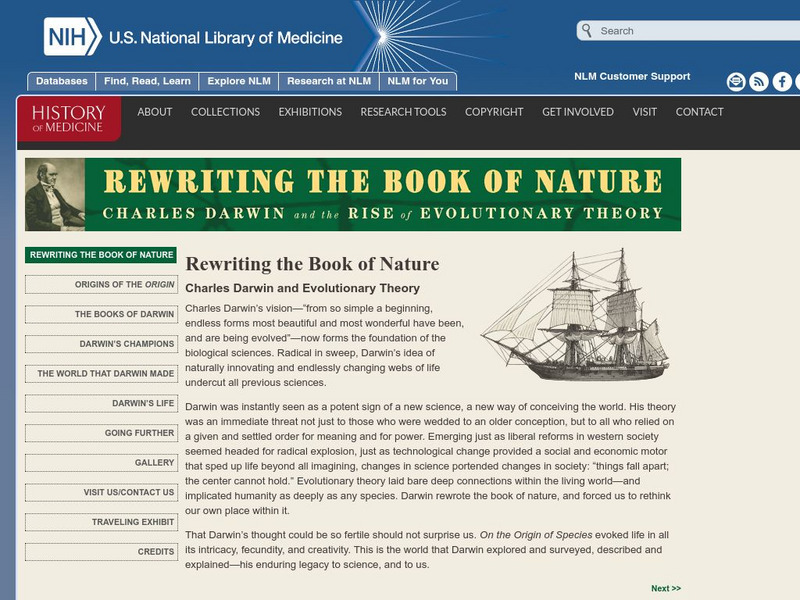University of California
Ucmp: Island Biogeography and Evolution
This is a lesson designed by a biology teacher. In it, students use maps and evidence of island age, molecular genetics, morphology, and distance apart to determine how the islands came to be occupied by different species of lizards. It...
Mind My Education
Mind My Education: The Life of Environments
This extensive lesson plan covers various topics about how animals interact with their environment. Topics include how animals sense their environment, how environments and organisms change together, and how animals use their senses to...
Bryn Mawr College
Bryn Mawr College: Evolution, Ecology, Diversity: Evolution by Natural Selection
After looking at examples of natural selection and doing a simulation activity, students investigate further by playing a simulation game and analyzing the data they collect. They then examine evidence of natural selection for the...
PBS
Pbs Learning Media: Adaptive Radiation: Darwin's Finches
Finches on the Galapagos Islands have evolved to exploit almost every possible niche. This diagram shows the range of food sources available on the island and the different beak shapes adapted to exploit each of them. Includes background...
Concord Consortium
Concord Consortium: Stem Resources: Predators and Prey
Did you ever want to be a hawk? In this virtual ecosystem, students will take on the role of a hawk and try to catch rabbits on a snowy field. Students will see which rabbits have adaptations that allow them to blend into the environment...
The Wonder of Science
The Wonder of Science: 3 Ls4 2: Variation, Survival, and Reproduction
Work samples, phenomena, assessment templates, and videos that directly address standard 3-LS4-2: variation, survival, and reproduction
University of Michigan
Michigan Sea Grant: Teaching Great Lakes Science: Fish Identification
In this lesson, students examine the physical characteristics of fish that live in the Great Lakes and identify common features that help species to survive in that environment. Downloadable resources include a fish poster, fish family...
PBS
Nh Pbs: Nature Works: Nature Files
Resources to accompany a 16-episode science series created to help young minds better understand how plants and animals interact with their environment. A fantastic resource for elementary science teachers that includes state standards...
Utah Education Network
Uen: Trb 4:5 Investigation 5 Desert Dynamics
Fourth graders will understand how plants and animals adapt to their environment.
PBS
Pbs: Plum Landing
Invite students to visit ecosystems around the world with this collection. This collection includes activities for the classroom, after school, and families. Also included is games.
PBS
Pbs Learning Media: Dinosaur Train
Dinosaur Train sparks children's interest in life science and natural history. As they explore a variety of animals, children develop the inquiry skills and knowledge needed to help them think, talk and act like paleontologists. Choose...
Michigan State University
Michigan State University: Lets Net: Dinosaurs and Us Unit
The focus of this activity unit is on adaptation - how dinosaurs adapted to their habitat in order to survive. Students will explore online dinosaur exhibits and record information they find. This leads to a discussion of adaptation and...
eSchool Today
E School Today: Your Revision Notes on the Characteristics of Living Things
Discusses the five characteristics that living things have and nonliving things do not.
Arizona State University
Geo Literacy: The Desert Is Theirs: Adapting to Our Environment
The focus of this 3-part instructional activity is how the environment affects the human lifestyle. After reading the book, The Desert is Theirs by Byrd Baylor, students will understand how animals and humans have adapted to their...
E-learning for Kids
E Learning for Kids: Science: Iceland: What Are Adaptations?
Join Ike when he travels in the Arctic to learn about how animals adapt to cold environments.
Shippensburg University
Shippensburg University: Personality Theories: Jean Piaget
This is an excellent resource on the life and work of the Swiss educational psychologist Jean Piaget (1896-1980).
Scholastic
Scholastic: Science Explorations: Make the Match
See if you can match Galapagos Island Tortoises with the particular islands they live on. You can explore the islands to learn more about the habitats they contain.
Science Education Resource Center at Carleton College
Serc: Light at the Bottom of the Deep, Dark Ocean?
What types of adaptations enable deep-sea fishes to survive and collect food in the darkness of the deep ocean? Interactive, hands-on lesson plan takes students on an exploration of deepwater adaptations by searching for Skittles in a...
Science Education Resource Center at Carleton College
Serc: Arthropod Diversity and Evolution an After School Program
This website provides information required for a hands-on program that enables students to work alongside active museum curators, postdoctoral researchers, and collection managers. The programs will teach students to identify, classify,...
PBS
Pbs Kids: Nature Sketchpad: Nature Sketchpad
This digital drawing activity lets students follow a variety of missions to create their own artwork.
Other
The Rise of Evolutionary Biology: Darwin's Ideas
These pages are part of a site called "Evolution," that accompany a textbook by the same name. Mark Ridley is the author. This section is about Darwin, his travels, and his observations that led to "On The Origins Of Species."
Other
Evo Tutor: Evolutionary Processes
EvoTutor is your online resource for interactive simulations of evolutionary processes.
National Institutes of Health
National Library of Medicine: Rewriting the Book of Nature
Explore the work of Charles Darwin and the theory of evolution. This comprehensive resource includes information about Darwin's life in addition to the process of species evolution.
